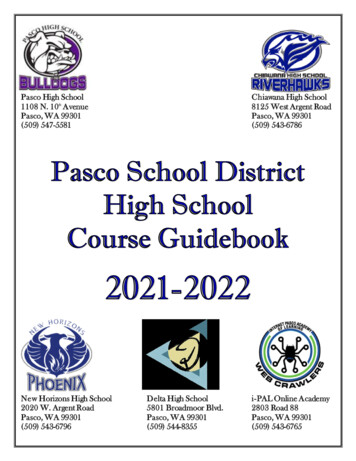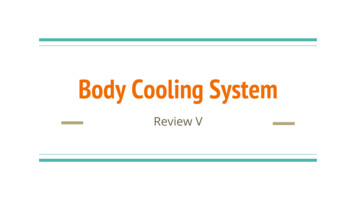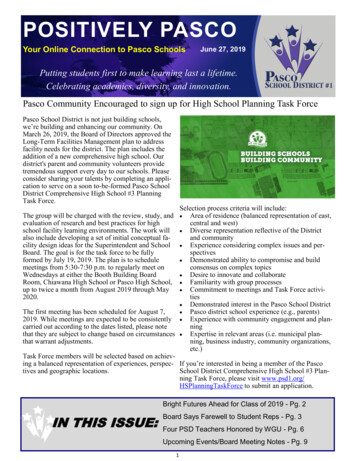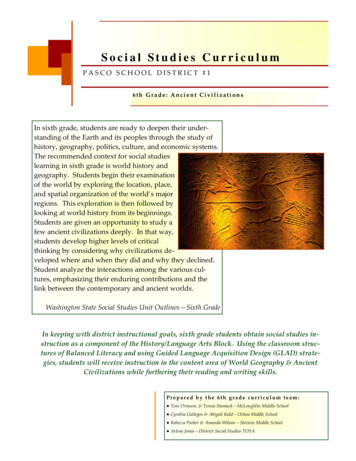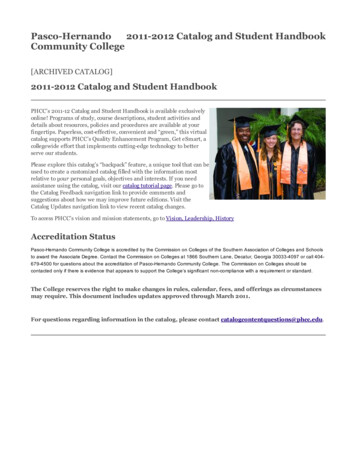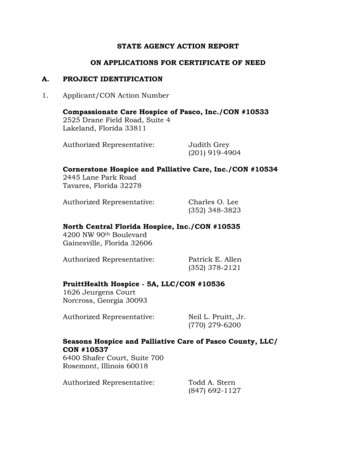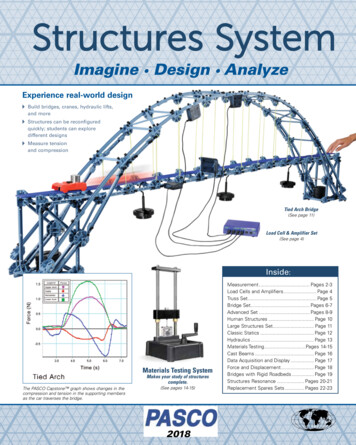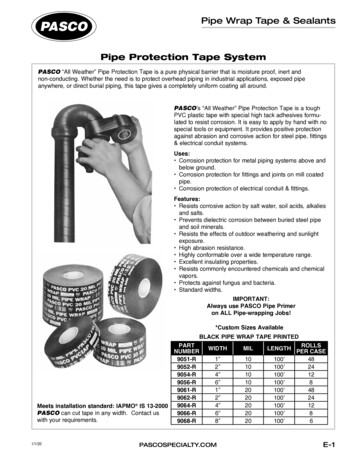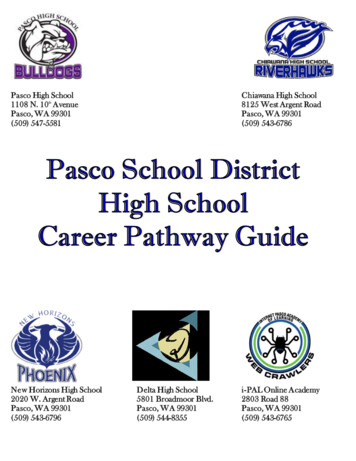
Transcription
Pasco High School1108 N. 10th AvenuePasco, WA 99301(509) 547-5581New Horizons High School2020 W. Argent RoadPasco, WA 99301(509) 543-6796Chiawana High School8125 West Argent RoadPasco, WA 99301(509) 543-6786Delta High School5801 Broadmoor Blvd.Pasco, WA 99301(509) 544-83550i-PAL Online Academy2803 Road 88Pasco, WA 99301(509) 543-6765
This Career Pathway Guide is a companion to the High School Course Guidebook. Students and families are encouraged to use these resourcestogether to help you identify potential careers, review recommended course-taking plans, and prepare for your 9 th – 12th grade coursework. Students andfamilies are encouraged to spend time discussing your options before completing course requests for the upcoming school year.An electronic copy of the High School Course Guidebook, Career Pathway Guide, and Post-High School Education Guide can be found at:https://www.psd1.org/Page/10587Table of ContentsCredit and Assessment Graduation Requirements (Classes of 202 2 through 2025) . 2College Credit Options for High School Students . 3Dual Enrollment Program Comparison Chart . 4Columbia Basin College Dual Credit Program . 5Earning Credits Through Credit Equivalency . 6Career Domains and Pathways . 6Holland Types and Pathways Survey. 8Arts & Communications Pathway . 11Business, Finance, & Information Technology Pathway . 12Engineering & Industrial Technology Pathway. 13Human Services Pathway . 14Science & Health Pathway . 15Types of Post-Secondary Training . 16Online Resources for Students & Families . 17Career and Technical Education Over view . 18Career & Technical Education . 19Chiawana High School STEM Program . 20New Horizons High School Career Connect Tech Program . 22Tri-Tech Skills Center . 24Tri-Tech Equivalency Credits . 27NOTICE OF NONDISCRIMINATIONPasco School District does not discriminate in any programs or activities on the basis of sex, race, creed, age, religion, co lor, national origin, veteran or militarystatus, sexual orientation, gender expression or identity, disability, or the use of trained guide dog or service animal. Pasco School District provides equal accessto the Boy Scouts, Girl Scouts, and other designated youth groups. Questions and complaints of alleged discriminatio n should be addressed to the followingdesignated employees: Title IX and Civil Rights Compliance Officer-Sarah Thornton; 1215 W. Lewis St., Pasco, WA 99301, 509 -543-6700, sthornton@psd1.org;and Sec. 504 Coordinator-Kristi Docken, 1215 W. Lewis St., Pasco, WA 99301, 509-543-6700, kdocken@psd1.org.1
Credit and Assessment Graduation Requirements (1)SubjectREQU IR E D CRE D IT SClass of 2022-20254.0English Language ArtsSocial StudiesMathematics(2) 3.01.0 credit Contemporary World Problems (2 courses in: Contemporary World History, Geography, and/orContemporary World Problems courses)1.0 credit US History (2 courses)0.5 credit of Civics (U.S. Government) (1 course)0.5 credit Social Studies electives (1 course in: history, geography, sociology, or psychology)Washington State History and Government as a non-credit requirement (3) 3.0Algebra 1-2 / Integrated Math IGeometry 1-2 / Integrated Math IIA third credit of math aligned to the student’s High School and Beyond Plan Science(4)3.02.0 credits must be lab sciencesCareer and Technical Education(CTE)1.00.5 Financial Literacy required, plus 0.5 other CTE program or occupational educationArts2.01.0 credit may be substituted for PPR coursesHealth and FitnessElectivesTotal Required CreditsNon-credit RequirementsPathway Requirement(6)2.0 World Languages(5)1.5 credit Fitness0.5 credit Health2.01.0-2.0 credits may be substituted for PPR courses (6)4.024.0High School and Beyond Plan and Washington State History and Government (subject to the provisions ofRCW 28A.230.170, RCW 28A.230.090, and WAC 392-410-120)All students will take the Smarter Balanced (SBA) ELA Exam, Smarter Balanced (SBA) Math Exam, and WashingtonComprehensive Assessment of Science (WCAS). To meet graduation requirements, students must demonstrateEnglish and Math proficiency through one of the following pathways:English Proficiency: Math Proficiency:Meet standard on the SBA ELA examMeet standard on alternative exam (SAT, ACT)Complete a college level course in ELA(7) Meet standard on the SBA Math exam (7)Meet standard on alternative exam (SAT, ACT)Complete a college level course in MathMeet standard on the ASVAB exam (meets both English and Math)Complete a 2.0 credit (4-course) approved CTE pathway (meets both English and Math)Notes:(1)(2)(3)(4)(5)(6)(7)Graduation requirements apply to a student based on the year the student begins 9th grade. The graduation requirements for the student’s expected graduation year must be met,regardless of when the student actually graduates (WAC 180-51-035).Core 24 graduation requirements begin with the Class of 2021.The Washington State History requirement may be met in middle school (grade 7-8) through successful completion of a designated course. The Pasco middle school course does notearn high school credit; students must still complete 3.0 credits of social studies in high school. For students who did not successfully complete the middle school course, a high schoolalternative option is offered to meet this requirement.Students are required to take 3.0 credits of math, which include: Algebra 1-2 or Integrated Math I; Geometry 1-2 or Integrated Math II; an additional level of math, such as Algebra 3-4,Integrated Math III, Pre-Calculus, Statistics, Financial Algebra, etc. The third credit of math should align with the student’s High School and Beyond Plan, prepare students to meetstate assessment system standards, and be chosen with the agreement of the parent/guardian or school counselor/principal if the parent/guardian does not indicate a preference(WAC 180-51-068).Career and Technical Education (CTE) courses locally determined to be equivalent to a non-CTE course may be used to meet two graduation requirements (WAC 180-51-067 andWAC 180-51-068), known as the “two for one” policy. Either a CTE course or an occupational education course may be used to meet the requirement. At a minimum, competenciesshall align with the definition of an exploratory course as contained in the CTE program standards of OSPI (WAC 180-51-067 and WAC 180-51-068).Personalized Pathway Requirements (PPR) are up to 3.0 credits chosen by a student to meet specific post-secondary career or education goals that align with the student’s interestsand High School and Beyond Plan. PPR credits may replace 1.0 credit in the Arts and 2.0 credits of World Languages.For graduation purposes, the State Board of Education has set exit exam passing scores on Smarter Balanced tests that may be different from the consortium-determinedachievement levels.2
COLLEGE CREDIT OPTIONS FOR HIGH SCHOOL STUDENTSTo meet students post-high school goals, Pasco School District works with a variety of partners to provide college credit-earningopportunities for students while still enrolled in high school. Course offerings are dependent on staff availability. For a b rief description ofeach program, see below.Columbia Basin College Dual CreditColumbia Basin College provides college-level career and technical education (CTE) courses through the Dual Credit program for selectCTE courses. Dual Credit is a statewide program which allows high school students to earn high school and college credit at the same time.These credits typically apply to a technical degree, which a student completes post-high school. Students must earn an 85% or better forall courses within a designated Dual Credit area in order to receive the college credit. This credit is offered at no cost to ourstudents/families. There are courses available at all of our campuses, including through participation in the Tri -Tech Skills Center programs.For a list of courses, see below.University College in the High School / CWU CornerstonePasco School District currently partners with state universities to provide college-level courses and dual credit through the College in theHigh School program. Students enroll in the college-level course at their high school campus and earn both high school and college credit.Some courses have prerequisites which must be met before enrolling. Courses offered through this program earn students credits whichtypically apply to AA/BA/BS degrees at a community college or university. Tuition is offered at a reduced rate. Currently PSD pays all tuitioncosts for students. There are no university fees or books which must be purchased. Offerings may vary by campus, dependent on availablepersonnel. Offerings may include courses in English Language Arts, Humanities, Social Studies, Sociology, Mathematics, Biology,Chemistry, Physics, IT courses, Leadership, and more! Under state law, these courses require students to have 10 th grade or higherstanding to enroll for college credit.Advanced Placement (AP)AP courses are offered in a variety of subjects and are indicated with the designation AP in the course title. These courses prepare studentsto take the AP exam in the designated subject area in the spring. Students may earn college credit with qualifying scores on each exam. Itis important students investigate colleges they are interested in attending, as all colleges and universities have policies a round assignedcollege credit based on AP scores.Columbia Basin College – Running StartStudents may enroll in college-level courses which are located on the CBC campus in Pasco during their junior and/or senior years.Students sign up for courses with their high school counselor, and concurrently earn college and high school credit while attending thecollege campus. There are testing requirements before a student may enroll in given courses or subject areas. In addition, students areresponsible for any associated university fees, books, or supplies. Tuition costs are covered through the state Running Start funding model.Please see your counselor for more information.Washington State University – Running StartStudents may enroll in college-level courses which are located on the WSU Tri-Cities campus in north Richland during their junior and/orsenior years. Students sign up for courses with their high school counselor, and concurrently earn college and high school credit whileattending the college campus. There are rigorous requirements before a student may enroll in this program. Students are respo nsible forany associated university fees, books, or supplies. Tuition costs are covered through the state Running Start funding model. Please seeyour counselor for more information.3
COLLEGE CREDIT OPTIONS COMPARISON CHARTCBC Dual CreditHigh school class contentequivalent to community collegeclassTaught by high school teacherClass transcripted as high schoolcourse; additional collegetranscript generatedStudent attends class at the highschool campusHigh school materials are usedLab or materials fees are NOTchargedNo cost, but student must meet85% assessment ratings for eachterm of course to earn the creditCourse offerings setcollaboratively by PSD and CBCCollege in the High SchoolHigh school class content equivalent tocollege level class in rigor and contentAdjunct college professor (which maybe a high school teacher)Class transcripted as college in the highschool course; additional collegetranscript generatedStudent attends class at the high schoolcampusHigh school books and supplementalmaterials are usedLab or materials fees are NOT chargedAdvanced PlacementHigh school class withapproved AP syllabus /contentTaught by high schoolteacher with AP trainingClass transcripted as highschool courseRunning StartStudent attends college class oncollege campus, with college studentsStudent attends class at thehigh school campusStudent attends class at college withgeneral public; student must provideown transportationStudent pays for college texts andmaterialsStudent pays all fees (parking, lab,online, fitness center, etc.)Student does not pay tuition if creditsare within state legislative allotment;limits number of courses student canenroll in at high school campusCourse offerings set by collegeReduced tuition, current rate: 35/credit*High school materials areusedLab or materials fees areNOT chargedTesting cost, approximately 89/exam*subject to changeCourse offerings set collaboratively byPSD and university partnerCourse offerings set by highschool4Taught by college professorClass transcripted as college course
COLUMBIA BASIN COLLEGE DUAL CREDIT PROGRAMCollege Credit can be obtained through an articulation agreement for Dual Credit with Columbia Basin College (CBC). This partnership between CBCand Pasco School District has been created to assist students by granting credit which is placed on a CBC Transcript providin g the student has earneda grade of at least 85% each trimester of enrollment in the approved course(s). CBC has made every effort to provide accuracy within this summary ofTech Prep articulated programs. Final course equivalency is based on articulation agreements between each school and CBC.High SchoolHigh School CourseMarketing Management 1-2(two trimesters required)CASE Animal Science(one year enrollment required)Careers in Education(one year enrollment required)Commercial Foods Academy 1 st year(two trimester enrollment required)Commercial Foods Academy 2 nd year(two trimester enrollment required)Construction TradesCompletion of certificationEarly Childhood Education GRADS(two trimester enrollment required)Entrepreneurship(two trimester enrollment required)Fashion Marketing Sports &Entertainment Marketing (must be taken insame year)Financial Literacy(one semester enrollment required)CASE Plant Science(one year enrollment required)Financial AlgebraIntroduction to Marketing 1-2(two trimester enrollment required)School Store Operations(two trimester enrollment required)School Store Management(two trimester enrollment required)CAD/Solid Works(two trimester enrollment required)Technology Literacy 1 or Microsoft OfficeSpecialist 1Microsoft Office Specialist 2Metals TechnologyColumbia Basin College Tech Prep ProgramCourse NameCollegeCourseBUS 265AG 102ECE 101ECE 118ECE 151ECE 1511BUS 120College CreditsMarketing Principles5Intro to Animal Science5Issues & Trends in ECE Skills Training; Supervised Practicum; *Supervised PracticumLab*To be determined*Only students whose internship placement is in abirth to age 8 (early childhood/K-3) setting for 33 or more contact hours are eligiblefor the supervised practicum lab credits.Personal Finance5BUS 267Marketing Special Projects5INT 101 Forklift Operations CertificationIHT 100 OSHA-10 Safety CertificationChild Care Basics1 (P/F)1 (P/F)3Salesmanship5BUS 103Salesmanship5BUS 120Personal Finance5HORT 202HORT 2021BUS 120Cultivated PlantsCultivated Plants LabPersonal Finance415BUS 103Salesmanship5BUS 272Organizational Development3BUS 267Marketing Special Projects5MT 102Solid Works for Machine Technology5CS 107Intermediate Word Processing2CS 108Intermediate Spreadsheets2ECED &100BUS 103WT 101Welding TechnologyWT 111Must pass welding exam administered by CBCMust pass the course with an 85% or better to be eligible for the articulated credit(s).54
EARNING CREDITS THROUGH CREDIT EQUIVALENCYSome CTE courses can be used to meet specific graduation course requirements. The following classes can be taken to meet the listedcourse requirement:Available Credit Equivalencies used for Graduation CreditThe following Career and Tech Ed courses can be used to meet high school graduation requirements.ENGLISH LANGUAGE ARTS (ELA) EQUIVALENCIESFINANCIAL LIT EQUIVALENCIESBusiness Communications* 0.5 EnglishBanking and Financial Services (3 trimesters) 0.5 Financial LitMarketing** - Any 4 trimesters combination of 0.5 Financial LitFINE ARTS EQUIVALENCIESFinancial Algebra** 0.5 Financial Literacy2D Animation* 0.5 Fine Arts; 3D Animation* 0.5 Fine ArtsComputer Aided Design (CAD)** 1-2 0.5 Fine ArtsLAB SCIENCE EQUIVALENCIESApplications in Nanotechnology 1-2 1.0 Lab ScienceFashion Marketing * 0.5 Fine Arts; Adv. Fashion Marketing * 0.5 Fine ArtsFloriculture** 1-2 1.0 Fine Arts Floriculture** 3-4 1.0 Fine ArtsCASE Ag Science** 1-2 (AFNR) 1.0 Lab ScienceInterior Design* 0.5 Fine ArtsCASE Animal Science 1-2 ** 1.0 Lab ScienceMetals Technology** 1-2, 3-4 ,5-6 1.0 Fine Arts / per two trimester sequenceCASE Plant Science 1-2 ** 1.0 Lab SciencePhotography * 1, 2, 3, 4 0.5 Fine Arts / per trimesterRobotics 1-2** 1.0 Lab ScienceVideo Production / Video Broadcasting* 0.5 Fine Arts / per trimesterWeb Design* 1, 2 0.5 Fine Arts / per trimesterP.E. / HEALTH EQUIVALENCIESWoods Technology** 1-2, 3-4, 5-6 1.0 Fine Arts / per two trimester sequenceFood and Fitness * 0.5 P.E. CreditSports Medicine** 1-2 and 3-4 0.5 HealthCAREER DOMAINS AND PATHWAYSTo support students in reaching their post-high school goals, the following section provides resources to identify possible career pathways of interest.CAREER PATHWAYS FREQUENTLY ASKED QUESTIONSWhat are Career Pathways?A career pathway is a broad grouping of careers that share similar characteristics and whose employment requirements call for many common inte rests,strengths and competencies. A chosen pathway focuses a student’s elective courses toward preparing for a specific goal area.Why should I choose a Career Pathway?o To help focus on a career area that matches interests in high schoolo To help set goals and discover classes necessary to achieve those goalso To create career awareness and encourage planning for postsecondary education and opportunitieso To provide knowledge that relates your high school education to the world after graduationHow do I choose a Career Pathway?o You have already been exposed to various career fields throughout your educational career; you will continue to explore career fields throughoutyour high school experienceo Your counselors, parents and teachers can assist you with this choiceo You can complete the self-assessment included in this GuidebookWhatoooooare some Career Pathway options?Arts & Communications (*including Performing Arts, Visual Arts, and Publishing Arts)Business, Finance, & Information Technology (*including Business Management and Administration, Marketing, and Finance)Engineering & Industrial Technology (*including Architecture, Construction, Manufacturing, STEM, Transportation and Logistics)Human Services (*including Education, Government and Public Administration, Human Services, Law, Public Safety, Corrections and Security, andHospitality and Tourism)Science & Health (*including Science Research, Medical, and Health Services)Will there be any change in my major academic studies?o You will still take all required core courses for graduation, regardless of your Pathway choice; all students have to meet the credit requirements foreach content area, as listed on the “Credit and Assessment Graduation Requirements” found on page 2o Aligning your elective options to your pathway can better prepare you for post-high school opportunities, including both education and careeroptions you may pursueFocusing on your career pathway early can provide you a solid foundation. You may select courses which are recommended core courses and electivecourses which lead to specific career goals.6
CAREER PATHWAYS – STEPS YOU CAN TAKE FOR YOUR FUTURE1) Complete the self-assessment tool on pages 8-10 to narrow down a primary and secondary pathway for possible exploration.2) Review the information throughout this Guidebook with a special focus on the areas and classes that fit your interests.3) Review the graduation requirements on page 2 to keep yourself on pace to graduate within the four-year timeline.4) Remember that most careers of the future will require some advanced training; be prepared to continue your education in a var iety of ways. Refer tothe different levels of education needed to access varying careers under each pathway area.a) Entry level positions are jobs most likely to begin immediately after high school.b) Skilled or technical occupations usually require advanced skills or technical training in a two-year program.c) Professional level occupations usually require four or more years of college/university experience.5) Work with your school counselor and cohort leader/advisor to make connections between your coursework and your High School and Beyond Plan.Remember – it’s okay to change your mind! The world of work has changed and most individuals have multiple careers over the course of the work life.Use high school as an opportunity to gain a solid academic foundation and learn about your own interests so you can pursue an education and/or careeryou love after high school!As you consider your core course choices as well as elective course choices, consider which classes may fit into the career a reas in your top pathwaychoices. It is likely you will enjoy these classes more, as they align to your own interests and talents. Of course you can still take other courses; werecommend pathway related coursework as it may better prepare for a career in your fields of interest.CAREER PATHWAYS SELF-ASSESSMENTWho am I? What do you want to be when you grow up? There are many adults who still don’t know the answer to this question. How can th ey expectyou to know?One of the best ways to explore careers and get pointed in the right direction is to take an assessment test. These can measure things such as:InterestsSkillsValuesPersonalityThe nice thing about these is that there are no wrong answers. Your likes and dislikes are very important in career planning. They will supply you withideas about the types of jobs that might be a “best fit” for you. Since these assessments are only part of the entire career p uzzle, the results might notbe exactly what you expect. Use these results and other experiences to broaden your search and explore careers that you might not have otherwiseconsidered.The assessment that follows is based on the Holland Interest Inventory. At the end of the assessment you will have an interest profile that matchesdifferent career areas. Once you have completed and scored your results, you will get a primary and secondary pathway option for your future planning.Cross-sectorPartnershipsEmployer &CommunityEngagementDynamicTeaching &LearningCollege &CareerReadinessCareerDevelopmentPathwayPrograms7
Holland Types and Pathways SurveySTEP ONE:In each group, check the items that describe you. Then, count up the number of check marks and fill in the total. Be as honest as you can.Remember, there are no wrong answers!Are You?Can You?PracticalAthleticStraightforwardMechanically inclinedA nature loverLike To?Fix mechanical thingsSolve mechanical problemsPitch a tentPlay a sportRead a blueprintWork on carsTinker with mechanicsWork outdoorsBe physically activeUse your handsBuild thingsOperate tools & machineryR REALISTICR TOTAL Realistic people like to take a concrete approach to problem solving rather than rely on abstract theory. They generally show an interest in activities thatrequire motor coordination, skill, and physical strength.Pathways related to this type:Engineering and Industrial Technology (Skilled & Technical Services)Science and Health (Health Sciences)Finance and Information Technology (Business, Marketing, & Management)Are You?Can eLike To?Think abstractlySolve math problemsUnderstand physical theoriesDo complex calculationsUse a microscopeExplore ideasUse computersWork independentlyPerform lab experimentsRead scientific and technicalmagazinesAnalyze dataI INVESTIGATEI TOTAL Investigative people prefer to think, rather than act, to organize and understand, rather than persuade. They tend to be good at math and science.Pathways related to this type:Engineering and Industrial Technology (Skilled & Technical Services)Science and Health (Health Sciences)Are You?Can You?Like To?CreativeSketch, draw, paintIntuitiveImaginativeObservantInnovativeAn individualistPlay a musical instrumentWrite stories, poetry, musicDo complex calculationsDesign fashion or interiorsSing, act, danceA ARTISTICAttend concerts, theater, artexhibitsRead fiction, plays, poetryWork independentlyWork on craftsTake photographsExpress yourself creativelyA TOTAL Artistic people like to work on unstructured situations where they can use their creativity. They enjoy performing (theater a nd music) and the visual arts.Pathways related to this type:Arts and CommunicationsHuman Services8
Are You?Can erstandingLike To?Teach / train othersExpress yourself clearlyLead a group discussionModerate disputesPlan and supervise an activityCooperate well with othersWork in groupsHelp people with problemsParticipate in meetingsDo volunteer serviceWork with young peoplePlay team sportsS SOCIALS TOTAL Social people like to work with other people and seem to satisfy their need in teaching, counseling, or caring for other people. They are often goodpublic speakers with helpful, empathetic personalities.Pathways related to this type:Human ServicesScience and HealthFinance and Information Technology (Business, Marketing, & Management)Are You?Can You?Self-ConfidentAssertiveLike To?Initiate projectsConvince people to do thingsyour waySell things or promote ideasGive talks or speechesArrange activities and eventsLead a groupSociablePersuasiveEnthusiasticEnergeticE ENTERPRISINGMake decisions affecting othersBe elected to officeWin a leadership sales awardCampaign on political issuesMeet important peopleE TOTAL Enterprising people are verbally skilled and enjoy influencing and persuading others. They like to lead and tend to be assertive and enthusiastic.Pathways related to this type:Business, Finance, and Information TechnologyHuman ServicesAre You?Can You?Like To?Well groomedWork well within a systemAccurateDo a lot of paperwork in a shorttimeKeep accurate recordsUse a computerWrite an effective businessletterNumerically inclinedMethodicalConscientiousFollow clearly definedproceduresUse data processing equipmentWork with numbersType or take shorthandBe responsible for detailsEfficientC CONVENTIONALC TOTAL Conventional people don’t mind rules and regulations, and demonstrate self-control. They prefer structure and order in their work, are highly organized,and generally place value on prestige and status.Pathways related to this type:Business, Finance, and Information TechnologyHuman ServicesArts and Communication9
STEP TWO: Using your totals, identify the three letters that have the highest scores. Record the letter and number of checks in the boxesbelow:My Interest Codes Are:1.2.3.###STEP THREE: Now we will match your Holland Interest Type with Career Pathways. In the columns below, circle your three interest codeletters wherever they appear.Interest Codes:ACS ERISECRISA ECRISPathway:Arts & CommunicationsBusiness, Finance, & Information TechnologyEngineering & Industrial TechnologyHuman ServicesScience & HealthSTEP FOUR: Count the number of circles in each pathway to determine your
Pasco High School Chiawana High School 1108 N. 10 th Avenue 8125 West Argent Road Pasco, WA 99301 Pasco, WA 99301 (509) 547-5581 (509) 543-6786 New Horizons High School Delta High School i-PAL Online Academy 2020 W. Argent Road 5801 Broadmoor Blvd. 2803 Road 88
